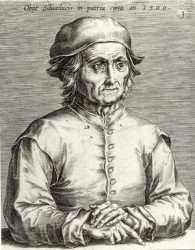
Van Puyvelde 1977
La Renaissance flamande de Bosch à Breughel (Leo van Puyvelde) 1977
[Les Ateliers d’Art Graphique Meddens, Brussels, 1977, 244 pages]
[Dutch edition: Leo van Puyvelde, De Vlaamse schilderkunst ten tijde van Bosch en Brueghel. Heideland-Orbis, Hasselt, 1977, 244 pages]
[Also mentioned in Gibson 1983: 23 (A113)]
In the second chapter, which is integrally allotted to Bosch, the author points out that since the end of the sixteenth century Bosch’s work has been viewed somewhat belittlingly as drollen (oddities), whereas today the opposite is true: Bosch is taken way too seriously and all sorts of intentions are attributed to him, intentions the master himself would never have thought of.
According to Van Puyvelde everyone with a minimum of common sense can easily understand Bosch. A lot of interpretations are simply far-fetched. The Garden of Delights hides no riddles if one surrenders to its poetry, the strange vegetation on the Ghent St. Hieronymus does not refer to all sorts of vices but basically to the oriental wilderness in which the hermit retired.
Bosch was not the extravagant person he is turned into by some authors. On the contrary he was a pious man whose ideas perfectly matched those of the majority of his contemporaries. He preached the gospel and traditional morality with a smile and in a language that was and still is easily accessible. If every now and then his oeuvre does contain an ‘odd’ element, this has to be attributed to his extraordinary fantasy and his lively sense of humour.
Van Puyvelde believes that Bosch would be far better understood if, instead of looking for parallels between his art and esoteric writings, the Dutch drama of his times was examined again. The author also spends some thoughts on Bosch’s style and on a number of his followers (Jan Mandyn, the Master of the Prodigal Son, Peter Huys).
[explicit]